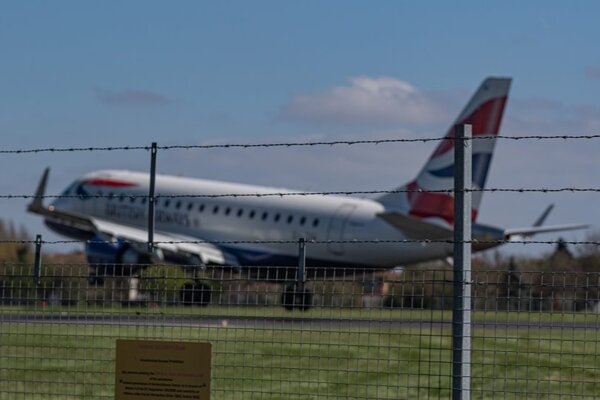The Big Question: Is direct action targeting air travel ever justifiable?
Climate activists don’t believe travel is taking sustainability seriously, and have taken matters into their own hands. But is this the best way to make people fly – and pollute – less?
At TTG, we believe the exchange of views and ideas is key to progress. Our Big Question series continues in August with a look at recent action by climate activists targeting commercial air travel – and whether disrupting aviation is justifiable.
Over centuries, and to this day, direct action – in the form of protests, marches and civil disobedience – undoubtedly still gets attention, and results. Just Stop Oil made headlines in June after two of its supporters entered Stansted’s private airfield and daubed two private jets with orange paint.
Citing a source in the group, The Times reported Just Stop Oil was planning a “sustained period of action” over the summer, likely to target aviation. In late June, 27 of its supporters were arrested on suspicion of planning to disrupt airports.
Just this week, climate activists from across Europe staged coordinated action to disrupt aviation under a new "Oil Kills" banner, including at Heathrow, although they were thwarted before the reached the airfield. The coalition says it is planning further action in the UK and Europe, and in North America.
Studies put aviation’s contribution to global carbon emissions at between 2% and 4%, but many nonetheless consider aviation one of the main contributors to climate change.
The industry claims it is one of the hardest to decarbonise, with the necessary technology still either in development – hydrogen and electric aircraft – or too expensive or scarce to roll our globally, such as sustainable aviation fuels.
However, a perception of slow progress, one casting doubt on aviation’s ability to achieve 2030 and 2050 climate goals, has prompted climate change activists to act.
“Illegal actions are never justifiable,” AirportsUK chief executive Karen Dee tells TTG, while Responsible Travel chair Justin Francis describes the action as “a desperate last attempt to protect our home and future”.
So this month, we ask – in an increasingly polarised world – whether these divisive acts are ever justifiable, and consider whether they’re the best way to encourage the sector to change its ways more quickly.
What do you think? Join in the debate in the comments below, or email feedback@ttgmedia.com. Alternatively, head to one of TTG’s social media channels to get involved.
'Illegal actions risk the safety of passengers and airport staff'
Illegal actions, such as trespassing and damaging private property as a form of protest, are never justifiable. In an airport setting, they are dangerous and risk the safety of passengers and staff.
As a result, and to protect the security and welfare of those who work in and travel through airports, we support the police in pursuing criminal prosecutions for trespass or criminal damage.
Aviation recognises it must change if we are all to continue to enjoy the benefits of air travel in future, from inward investment and job creation to foreign tourism and visiting loved ones overseas.
That’s why billions of pounds are being invested every year in green energy, sustainable ground operations, cleaner fuels and new aircraft. It is also why airports are in constant consultation with local communities in and around their locations to ensure issues are being identified and addressed.
Instead of putting lives and wellbeing at risk, those seeking to protest at airports should follow this example and work with us and our members to understand and support the hard work aviation is doing to change.
Engaging and collaborating in this way will allow us to accomplish even more, and avoid nasty confrontations between protesters and the authorities. This will lead to the best of all possible worlds. With constructive dialogue comes increased understanding and appreciation of the challenges all sides face.
It will also ensure the UK retains its reputation as a welcoming, friendly, accessible place for tourists and businesses, and supports the jobs, livelihoods and holidays we all rely on.
Karen Dee is chief executive of AirportsUK, formerly the Airport Operators Association.
'This action is a desperate last attempt to protect our home and future'
Our climate and nature emergencies demand urgent and radical action. We can’t “offset” these crises, and denial or complacency will cost us dearly.
To secure our future, we must cut carbon and restore nature. That necessitates change – to what we produce, consume and waste, and yes, how we travel. Until it’s truly sustainable, we need to fly less.
We can each make positive lifestyle changes. And those do matter. But progress on the scale we need requires systemic change and robust regulation, yet our leaders sit on the fence failing to act. So what options are left?
Protest is vital, and history shows it can be highly impactful. But targeting the wrong doorsteps risks alienating the wider public, whose support is crucial. People who’ve worked hard all year to afford that one holiday aren’t the problem. Nor are those flying to be with loved ones who need them.
And what of the communities and conservation initiatives that rely on tourism? We need to fly less, not stop entirely. Target private jet use. Call out the fact airlines still pay no fuel tax, which could raise billions a year to invest in rail. Lobby your MP on aviation policy. I want to see polluters pay, not ordinary people.
The stakes couldn’t be higher. Direct action targeting air travel is a desperate last attempt to protect our home and future. In that light, it’s hard not to see justification, provided it is peaceful and safe.
We need to confront an uncomfortable reality. Disrupting air travel may be inconvenient, or worse. But if we fail to act on carbon, we face far graver consequences than delayed flights.
Justin Francis is chair of activist operator Responsible Travel.
'It’s difficult to imagine a better target for climate activism than aviation'
A recent survey by UK climate charity Possible of 50 environmental pledges made by airlines this century showed 49 had been missed or abandoned – a failure rate of 98%.
For all practical purposes, it’s therefore safe to assume that any promise on carbon emissions made by any airline can safely be ignored. Anyone who has followed the saga that was Heathrow’s expansion attempts will not be in the least bit surprised by this.
Yet governments continue to treat aviation’s participation in the drive to decarbonise as being in good faith, and they continue to at least pretend to believe the sector’s implausible claims and predictions.
If you accept direct action is sometimes necessary, then it’s difficult to imagine a better target than a highly carbon-intensive industry providing a non-essential service to a small percentage of the world’s population, a percentage which happens to include all the people with the power to regulate an industry which is, coincidentally, given a broad range of public subsidies and tax breaks.
The political backlash against decarbonisation policies that was visible during the recent European elections is fuelled by dubious claims that the rich are shielded from costs borne by the general public.
Many of these claims are false, but the leeway given to aviation – and particularly to private jet usage – makes it very difficult to argue against them when it comes to the transport sector.
This makes private jets not only the highest carbon mode of transport on earth, but also a source of social division that undermines wider decarbonisation efforts.
Graham Thompson is a spokesperson for Greenpeace UK.
'There are few other options available to those without lobbying power'
The simple answer to this question is "no". Or more accurately, in normal times, the sort of disruptive action that has been undertaken by Just Stop Oil would be entirely unacceptable.
However, what is also unacceptable is how 13 months of record temperatures has seen us slam through irreversible tipping points – threatening to send everything spinning out of control.
It is unacceptable that we have passed the 1.5C climate warming safety limit governments committed to in 2015, yet the response from governments is more oil and gas.
What is also unacceptable is the level of influence oil companies have over our legal system, our media and our politicians. The Policy Exchange think tank, which helped the government draft the Public Order Act, received funding from US oil firm ExxonMobil in 2017.
In the face of this monolithic power, there are few options available to those who do not possess billions of pounds to lobby politicians or own media empires to manipulate the news discourse.
History has shown us repeatedly that one option available to ordinary people is to cause massive disruption. This forces the issue to the top of the news agenda and to the forefront of the political debate. And although many may "shoot the messengers", the evidence is clear that society overwhelmingly hears the message.
It is time for governments to enact an international, legally binding treaty to end the extraction and burning of oil, gas and coal by 2030.
James Skeet is a spokesperson for Just Stop Oil.
The Big Question by TTG
The Big Question is a monthly feature from TTG taking on some of the burning issues facing travel through expert commentary, insight and debate. While it's not designed to be adversarial, it won't flinch from placing a spotlight on some often uncomfortable topics travel – like it or not – will one day have to reckon with.
- Is the 'S' word starting to put customers off?
- Is direct action targeting commercial travel ever justifiable?
- Is it time to rebrand the travel agent?
- Does travel have an ageism problem?
- Has travel added too much capacity for summer 2024?
- Can celebrity endorsements ever be truly responsible?
- Do women have equal opportunity to progress in travel?
- Should the cruise sector shout about lower prices?
- Is it time for a change of government?
- Has the pandemic changed peaks for ever?
- Is it finally time to turn APD into an environmental tax?
- Does all-inclusive value come at too high a price for the planet?
- Can cruise sail ahead of land-based breaks?
- Should travel companies still be selling captive animal attractions?
- Can aviation do more to help disabled travellers?
- Is there a future for private jets in travel?
- Should agents start charging for their time?
- Is it finally time to reform the Atol scheme?
- Should we be flying during a climate crisis?
Sign up for weekday travel news and analysis straight to your inbox

Ilaria Grasso Macola
Supplier Directory
Find contacts for 260+ travel suppliers. Type name, company or destination.


















